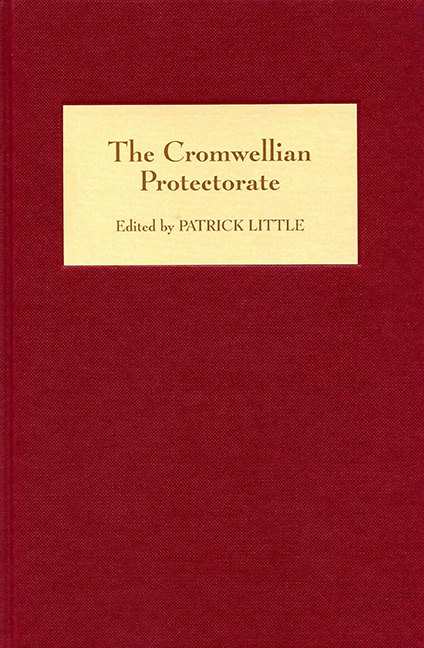Book contents
- Frontmatter
- Contents
- List of Illustrations
- Preface
- Notes on Contributors
- Abbreviations
- 1 Introduction
- 2 Oliver Cromwell and the Protectorate Parliaments
- 3 The Protector Humbled: Richard Cromwell and the Constitution
- 4 Cromwellian Style: The Architectural Trappings of the Protectorate Regime
- 5 Oliver Cromwell and the Council
- 6 ‘To Create a Little World out of Chaos’: The Protectoral Ordinances of 1653–1654 Reconsidered
- 7 The Irish and Scottish Councils and the Dislocation of the Protectoral Union
- 8 ‘This Murmuring and Unthankful Peevish Land’: Wales and the Protectorate
- 9 Cromwellian Towns in the Severn Basin: A Contribution to Cis-Atlantic History?
- 10 Policing the Cromwellian Church: The Activities of the County Ejection Committees, 1654–1659
- Index
2 - Oliver Cromwell and the Protectorate Parliaments
Published online by Cambridge University Press: 24 October 2017
- Frontmatter
- Contents
- List of Illustrations
- Preface
- Notes on Contributors
- Abbreviations
- 1 Introduction
- 2 Oliver Cromwell and the Protectorate Parliaments
- 3 The Protector Humbled: Richard Cromwell and the Constitution
- 4 Cromwellian Style: The Architectural Trappings of the Protectorate Regime
- 5 Oliver Cromwell and the Council
- 6 ‘To Create a Little World out of Chaos’: The Protectoral Ordinances of 1653–1654 Reconsidered
- 7 The Irish and Scottish Councils and the Dislocation of the Protectoral Union
- 8 ‘This Murmuring and Unthankful Peevish Land’: Wales and the Protectorate
- 9 Cromwellian Towns in the Severn Basin: A Contribution to Cis-Atlantic History?
- 10 Policing the Cromwellian Church: The Activities of the County Ejection Committees, 1654–1659
- Index
Summary
Oliver Cromwell's inability to achieve an effective working relationship with successive parliaments during the 1650s remains one of the greatest ironies of the English revolution. It was also a crucial reason why the English republic failed to generate lasting political stability. This chapter will reconsider this problem and suggest that the principal difficulty lay in Cromwell's desire to use parliament to reconcile the interests of the English nation as a whole with those of a godly minority (including himself) who embraced a radical religious agenda. He hoped that through parliaments the nation and the godly people could become coterminous. His refusal to acknowledge the essential incompatibility of these two interests lay at the heart of his failure to find any parliament that fulfilled his high hopes. I shall argue that the principal reason for that failure ultimately lay in the incompatibility between the sort of reforms that Cromwell wanted parliament to pursue – the vision of a godly commonwealth that he wished it to promote – and the attitudes and priorities of the majority of members of parliament. Although, as Ivan Roots and Peter Gaunt have argued, it is important not to overlook the legislative achievement of the protectorate parliaments, equally, their performance fell far short of what Cromwell desired. Always he searched for a parliament that would promote his vision of a godly commonwealth, and always it eluded him.
This failed quest reached its climax in the first and second protectorate parliaments of 1654–5 and 1656–8. But to set that failure in context, we need to begin by briefly examining why Cromwell had earlier fallen out with the Long Parliament, in whose armies he had played such a critical role during the civil wars. He clearly believed in the justice of parliament's cause against Charles I in that conflict. As he wrote to Colonel Valentine Walton in September 1644: ‘we study the glory of God, and the honour and liberty of the parliament, for which we unanimously fight, without seeking our own interests’. However, Cromwell's loyalty to parliament was not unconditional. He thought that it had a trust imposed upon it and that it should be held accountable, above all to God's cause and to the godly people.
- Type
- Chapter
- Information
- The Cromwellian Protectorate , pp. 14 - 31Publisher: Boydell & BrewerPrint publication year: 2007



